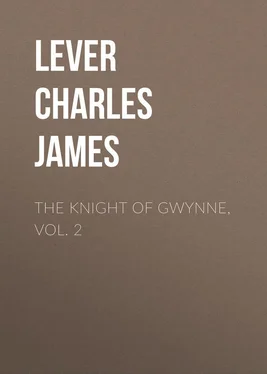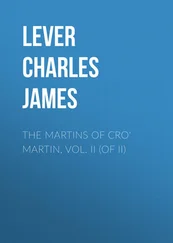Charles Lever - The Knight Of Gwynne, Vol. 2
Здесь есть возможность читать онлайн «Charles Lever - The Knight Of Gwynne, Vol. 2» — ознакомительный отрывок электронной книги совершенно бесплатно, а после прочтения отрывка купить полную версию. В некоторых случаях можно слушать аудио, скачать через торрент в формате fb2 и присутствует краткое содержание. Жанр: foreign_antique, foreign_prose, на английском языке. Описание произведения, (предисловие) а так же отзывы посетителей доступны на портале библиотеки ЛибКат.
- Название:The Knight Of Gwynne, Vol. 2
- Автор:
- Жанр:
- Год:неизвестен
- ISBN:нет данных
- Рейтинг книги:4 / 5. Голосов: 1
-
Избранное:Добавить в избранное
- Отзывы:
-
Ваша оценка:
- 80
- 1
- 2
- 3
- 4
- 5
The Knight Of Gwynne, Vol. 2: краткое содержание, описание и аннотация
Предлагаем к чтению аннотацию, описание, краткое содержание или предисловие (зависит от того, что написал сам автор книги «The Knight Of Gwynne, Vol. 2»). Если вы не нашли необходимую информацию о книге — напишите в комментариях, мы постараемся отыскать её.
The Knight Of Gwynne, Vol. 2 — читать онлайн ознакомительный отрывок
Ниже представлен текст книги, разбитый по страницам. Система сохранения места последней прочитанной страницы, позволяет с удобством читать онлайн бесплатно книгу «The Knight Of Gwynne, Vol. 2», без необходимости каждый раз заново искать на чём Вы остановились. Поставьте закладку, и сможете в любой момент перейти на страницу, на которой закончили чтение.
Интервал:
Закладка:
Lions were not as fashionable in those days as at present; but still the party had its share in the person of Counsellor O’Halloran, the great orator of the bar, and the great speaker at public meetings, the rising patriot, who, not being deemed of importance enough to be bought, was looked on as incorruptible. He had come down special to defend O’Reilly in a record of Darcy versus Hickman, – the first case submitted for trial by Bicknell, and one which, small in itself, would yet, if determined in the Knight’s favor, form a rule of great importance respecting those that were to follow.
It was in the first burst of Hickman O’Reilly’s indignation against Government that he had secured O’Halloran as his counsel, never anticipating that any conjuncture would bring him once more into relations with the Ministry. His appointment of high sheriff, however, and his subsequent correspondence with Heffernan, ending with the invitation to the abbey, had greatly altered his sentiments, and he more than once regretted the precipitancy with which he had selected his advocate.
Whether “the Counsellor” did or did not perceive that his reception was one of less cordiality and more embarrassment than might be expected, it is not easy to say, for he was one of those persons who live too much out of themselves to betray their own feelings to the world. He was a large and well-looking man, but whose features would have been coarse in their expression were it not for the animated intelligence of his eye, and the quaint humor that played about the angles of his mouth, and added to the peculiar drollery of an accent to which Kerry had lent all its native archness. His gestures were bold, striking, and original; his manner of speaking, even in private, impressive, – from the deliberate slowness of his utterance, and the air of truthfulness sustained by every agency of look, voice, and expression. The least observant could not fail to remark in him a conscious power, a sense of his own great gifts either in argument or invective; for he was no less skilful in unravelling the tangled tissue of a knotted statement than in overwhelming his adversary with a torrent of abusive eloquence. The habits of his profession, but in particular the practice of cross-examination, had given him an immense insight into the darker recesses of the human heart, and made him master of all the subtleties and evasions of inferior capacities. This knowledge he brought with him into society, where his powers of conversation had already established for him a high repute. He abounded in anecdote, which he introduced so easily and naturally that the à propos had as much merit as the story itself. Yet with all these qualities, and in a time when the members of his profession were more than ever esteemed and courted, he himself was not received, save on sufferance, into the better society of the capital. The stamp of a “low tone,” and the assertion of democratic opinions, were two insurmountable obstacles to his social acceptance; and he was rarely, if ever, seen in those circles which arrogated to themselves the title of best. Whether it was a conscious sense of what was “in him” powerful enough to break down such barriers as these, and that, like Nelson, he felt the day would come when he would have a “ Gazette of his own ,” but his manner at times displayed a spirit of haughty daring and effrontery that formed a singular contrast with the slippery and insinuating softness of his nisi prius tone and gesture.
If we seem to dwell longer on this picture than the place the original occupies in our story would warrant, it is because the character is not fictitious, and there is always an interest to those who have seen the broad current of a mighty river rolling onward in its mighty strength, to stand beside the little streamlet which, first rising from the mountain, gave it origin, – to mark the first obstacles that opposed its course, – and to watch the strong impulses that moulded its destiny to overcome them.
Whatever fears Hickman O’Reilly might have felt as to how his counsel, learned in the law, would be received by the Government agent, Mr. Heffernan, were speedily allayed. The gentlemen had never met before, and yet, ere the first day went over, they were as intimate as old acquaintances, each, apparently, well pleased with the strong good sense and natural humor of the other. And so, indeed, it may be remarked in the world, that when two shrewd, far-reaching individuals are brought together, the attraction of quick intelligence and craft is sufficient to draw them into intimate relations at once. There is something wonderfully fraternal in roguery.
This was the only social difficulty O’Reilly dreaded, and happily it was soon dispelled, and the general enjoyment was unclouded by even the slightest accident. The judges were bon vivants , who enjoyed good living and good wine; he of the Common Pleas, too, was an excellent shot, and always exchanged his robes for a shooting-jacket on entering the park, and despatched hares and woodcocks as he walked along, with as much unconcern as he had done Whiteboys half an hour before. The Solicitor-General was passionately fond of hunting, and would rather any day have drawn a cover than an indictment; and so with the rest, – they seemed all of them sporting-gentlemen of wit and pleasure, who did a little business at law by way of “distraction.” Nor did O’Halloran form an exception; he was as ready as the others to snatch an interval of pleasure amid the fatigues of his laborious day. But, somehow, he contrived that no amount of business should be too much for him; and while his ruddy cheek and bright eye bespoke perfect health and renewed enjoyment, it was remarked that the lamp burned the whole night long unextinguished in his chamber, and that no morning found him ever unprepared to defend the interest of his client.
There was, as we have said, nothing to throw a damper on the general joy. Fortune was bent on dealing kindly with Mr. O’Reilly; for while he was surrounded with distinguished and delighted guests, his father, the doctor, the only one whose presence could have brought a blush to his cheek, was confined to his room by a severe cold, and unable to join the party.
The assize calendar was a long one, and the town the last in the circuit, so that the judges were in no hurry to move on; besides, Gwynne Abbey was a quarter which it was very unlikely would soon be equalled in style of living and resources. For all these several reasons the business of the law went on with an easy and measured pace, the Court opening each day at ten, and closing about three or four, when a magnificent procession of carriages and saddle-horses drew up in the main street to convey the guests back to the abbey.
While the other trials formed the daily subject of table-talk, suggesting those stories of fun, anecdote, and incident with which no other profession can enter into rivalry, the case of Darcy versus Hickman was never alluded to, and, being adroitly left last on the list for trial, could not possibly interfere with the freedom so essential to pleasant intercourse.
The day fixed on for this record was a Saturday. It was positively the last day the judges could remain, and having accepted an engagement to a distant part of the country for that very day at dinner, the Court was to sit early, and there being no other cause for trial, it was supposed the cause would be concluded in time to permit their departure. Up to this morning the high sheriff had never omitted, as in duty bound, to accompany the judges to the court-house, displaying in the number and splendor of his equipages a costliness and magnificence that excited the wonder of the assembled gentry. On this day, however, he deemed it would be more delicate on his part to be absent, as the matter in litigation so nearly concerned himself. And half seriously and half in jest he made his apologies to the learned baron who was to try the cause, and begged for permission to remain at the abbey. The request was most natural, and at once acceded to; and although Heffer-nan had expressed the greatest desire to hear the Counsellor, he determined to pass the morning, at least, with O’Reilly, and endeavor afterwards to be in time for the address to the jury.
Читать дальшеИнтервал:
Закладка:
Похожие книги на «The Knight Of Gwynne, Vol. 2»
Представляем Вашему вниманию похожие книги на «The Knight Of Gwynne, Vol. 2» списком для выбора. Мы отобрали схожую по названию и смыслу литературу в надежде предоставить читателям больше вариантов отыскать новые, интересные, ещё непрочитанные произведения.
Обсуждение, отзывы о книге «The Knight Of Gwynne, Vol. 2» и просто собственные мнения читателей. Оставьте ваши комментарии, напишите, что Вы думаете о произведении, его смысле или главных героях. Укажите что конкретно понравилось, а что нет, и почему Вы так считаете.












